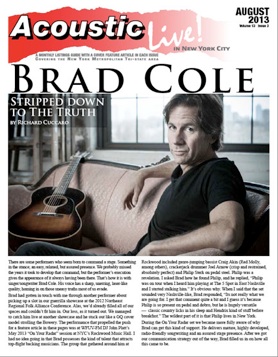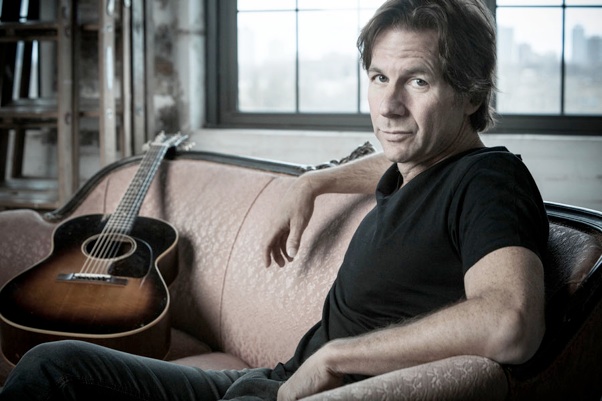Brad Cole
Stripped Down to the Truth
By Richard Cuccaro
There are some performers who seem born to command a stage. Something in the stance; an easy, relaxed, but assured presence. We probably missed the years it took to develop that command, but the performer’s execution gives the appearance of it always having been there. That’s how it is with singer/songwriter Brad Cole. His voice has a sharp, unerring, laserlike quality, homing in on those uneasy truths most of us evade.
Brad had gotten in touch with me through another performer about picking up a slot in our guerrilla showcase at the 2012 Northeast Regional Folk Alliance Conference. Alas, we’d already filled all of our spaces and couldn’t fit him in. Our loss, as it turned out. We managed to catch him live at another showcase and he stuck out like a GQ cover model strolling the Bowery.
The performance that propelled the push for a feature article in these pages was at WFUV-FM DJ John Platt’s May 2013 “On Your Radar” session at NYC’s Rockwood Music Hall. I had no idea going in that Brad possesses the kind of talent that attracts top-flight backing musicians. The group that gathered around him at Rockwood included genre-jumping bassist Craig Akin (Red Molly, among others), crackerjack drummer Joel Arnow (crisp and restrained, absolutely perfect) and Philip Sterk on pedal steel. Philip was a revelation. I asked Brad how he found Philip, and he replied, “Philip was on tour when I heard him playing at The 5 Spot in East Nashville and I started stalking him.” It’s obvious why. When I said that the set sounded very Nashville-like, Brad responded, “It’s not really what we are going for. I get that comment quite a bit and I guess it’s because Philip is so present on pedal and dobro, but he is hugely versatile — classic country licks in his sleep and Hendrix kind of stuff before breakfast.” The wildest part of it is that Philip lives in New York.
During the On Your Radar set we became more fully aware of why Brad can get this kind of support. He delivers mature, highly developed, radio-friendly songwriting and an assured stage presence. After we got our communication strategy out of the way, Brad filled us in on how all this came to be.
Beginnings
In a suburb called Graymoor, on the south side of Chicago, Brad Cole spent what he calls a boring but safe childhood. His father was into jazz. Count Basie, Benny Goodman, Ella Fitzgerald, Louie Prima and Frank Sinatra took their turns on the stereo. When Brad’s older brother and sister came home from college, they brought home a deluge of rock ’n’ roll. An electric current flowed from The Beatles’ Sgt. Pepper, Frank Zappa, Blood, Sweat and Tears, The Beach Boys’ Pet Sounds, The Who’s Tommy, James Taylor’s Sweet Baby James, Elton John’s Tumbleweed Connection, Blind Faith, and Santana’s Abraxas. Motown also loomed large.
Brad “made” his mother take him to see the movie Woodstock before he was 10 years old. His earliest memory of playing was bongos along with his older brother and his friends while they played Kingston Trio and Beatles covers. “I don’t think I ever made it out of the basement though,” Brad recalled.
He got a drum kit for his bar mitzvah but, since they lived in a small house, the drums did not last long.
During his high school years, the only music he was involved with was temple choir. Brad said he was pretty shy, but also admits that he and his friends partied a lot. For them, listening to music and going to concerts was everything. “It was our language and it was our way,” he said.
The Doorway of Higher Learning
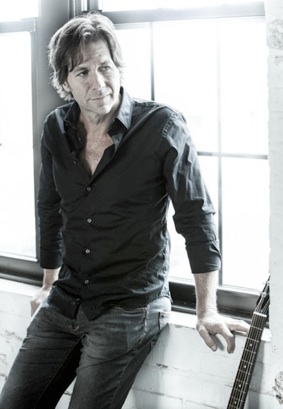
As soon as he got out of college, Brad put a band together and called it Treatment. He stated: “We were all about The Police, New Order, The English Beat and Bob Marley. We weren’t great, but it worked — mixing ska, reggae, and rock. It was fun.” Brad was the front man and wrote all the songs. “At that time, it was more about dancing and drinking,” he told me. Now he sees his musical calling as more about journeys and laments.
In short order, they were headlining major venues in Chicago, talking to labels and setting up a tour.
Hitting a Wall
Things came to a crashing halt when Brad’s older brother was shot and killed. “Everything for me shut down,” he said. In a sort of limbo, describing that time, Brad says he “floated for a while.” Having married a few years before, he told me, “My daughter Rachel was born, which was a gift from God. I worked a few different jobs and barely touched the guitar for about five years.”
Then one day a woman he worked with played Patty Griffin’s Living With Ghosts. “That flipped the switch,” he said. “She moved me.” Brad immersed himself in Patty and the work of Shawn Colvin and Amiee Mann. Those were the performers/lyricists, who pulled him out of his malaise and set him in a new direction of playing.
Slow Turning
At this point Brad started to really listen to Bob Dylan, Woody Guthrie, Paul Simon and many other lyricists. He had taken them for granted and now recognized their brilliance. He began hanging around the Old Town School of Folk Music in Chicago and became part of its monthly songwriters group, Songwriters Forum, which was similar to the late Jack Hardy’s weekly Songwriter’s Exchange in New York. Brad’s new impetus was writing songs that were universal, that described the human condition, both others’ stories and his own. He didn’t break out of the rock realm immediately, but performed with a series of other bands in Chicago. One of them, The Second Story, did some touring and released Highway 200 in 2008. However, Brad described it as “still the same sort of club-rock music.” He had fun and grew as a player, but outside of the band’s friends and family, no one noticed.
Brad had been going to Nashville on and off beginning in 2007 just to hang out. He said, “Something about those trips made me a better listener, and also gave me hope that as a writer, I was on the right track.”
Breakthrough
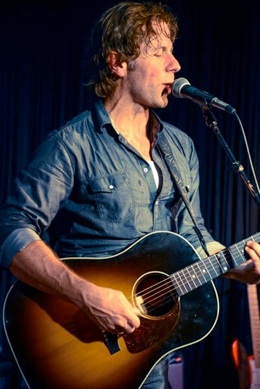
Brad’s solo album, Exile, came out in 2010. This record was more toned down. He had just been divorced so the writing and recording of this album were full of anger and heartache. He is still proud of its personal and universal expression. The lead track “Come Home” has won numerous songwriting awards.
There was still a struggle, though, for the right sound. He still felt the sense of being under the weight of the old rock framework
.
The Next Step
He described the next step this way: “So I moved to East Nashville late in 2011, wrote a bunch of songs, found some great teachers and recorded a very simple album. Something with a lot of space, and this is working for me. The album, Down The Line, has done exceptionally well in terms of airplay and sales, but the songs lend themselves to whoever I am playing with, and on stage, these songs take on a life of their own. They’re different every time. I guess this was my problem with my old records and where I was as a performer five -10 years ago. It all seemed so stiff.
“Now I am blending rhythms I love: old school bossa nova, reggae and soul, with more rootsy instrumentation like pedal steel and mandolin or even if it’s just me solo. The music is earnest, yet it moves. So by emptying out a lot of the noise in my writing and focusing on what’s true, what’s fun and what’s right, I am a happy guy and things are working.”
Brad has been touring nonstop now for three years. He does 120-plus shows a year, mostly east of the Mississippi. He says, “It’s a hustle but it’s working. It’s great.”
He has generated a loyal fan base that turns out for his shows and “that makes such a difference,” he said.
In his travels he says he sees so many players and finds very little that truly impresses him, but he still feels intrinsically inspired to make music of his own design: “an elusive sound which is a blend of styles that pushes me physically, mentally, intellectually and creatively.”
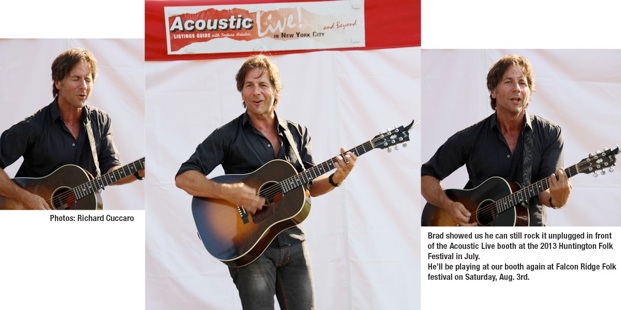
Making it Happen
At first listen, there appeared to me to be more similarities than differences between Exile and Down the Line. After repeated listens, the differences were clear. If Exile was Brad doing a somersault on solid ground, on Down the Line, he’s doing cartwheels on a tightrope in mid-air.
While I extol the refinements of Down the Line, it’s not to dismiss Exile. One track in particular, “Summer Leaves,” reels us in: Then Summer leaves / And her laughter echoes back to me what serious September brings / And I’m pulled along, at a different speed / Turn the page and it’s all gone, gone, gone, gone. The quick tempo belies the hurt evident in the melody and lyrics.
The much-lauded lead track on Exile, “Come Home,” is an inspired song channeling a military man who wishes nothing more than to return home and leave the madness of war behind. I want to come home to you tonight, lay my body down / And help me find some love for this empty heart / Help me find peace when I fall apart / And never let this river carry me so far away again.
We definitely hear a number of songs that channel his “old” rock sensibility. “Monster,” “A Leg to Stand On,” “The Air,” and “My Oasis” use a lot of crunchy, distorted lead guitar licks at times, with heavy drum and bass lines and heavy reverb. However, that said, it’s all done so deftly that it’s obvious Brad could have gone on indefinitely, making good money fronting rock bands in clubs. It took a strong urge to create a more sublime version of life’s truths to pry him away from repeating that pattern. While Brad was not entirely satisfied with Exile, he had set the bar pretty high for improvement.
But… improve he did. There’s a stripped-down quality to Down the Line that allows a more intimate feel and a sense that Brad is drawing us much closer to him.
The lead track, “Cry, Cry, Cry,” is crafted like a Rubik’s cube, the lyrics and melody nimbly exploring the agony of love lost. Well it’s springtime in Chicago and the gray is all gone / The president is on the TV talking ’bout urban renewal and he’s ramblin’ on / I should be happy, the sun has found the sky / But all I can think about is the love I let pass me by / cry cry cry.
In “Something About Goodbye,” Brad strips his past and his emotions bare: I’m here in Music City, putting in my time / I’m far from my old town, it gets lonely here sometimes / but I am fine, and you are on my mind / Did I say how much I love you? / Thank you proper for our time? / Did I hold you close enough, To feel your heart beat, next to mine? / Oh, I miss you... / I signed up for the journey, I was shooting for the stars, / I was going for the big time but ended up in bars / If I’m shakin’ like The King, or sleepin’ in my car, I can call on you. We can see now why he made the changes in his life. Listening to this song closely, I am belatedly shaken.
We recorded Brad performing one of his new songs, “Union of Souls,” at the On Your Radar show. It offers hope in a new relationship: Between you and me I feel a spark, I feel your current radiate inside of me. I feel we are the same. / Like me, you’ve been knocked down, weathered by the rain… / No more waiting, only moments, as we run this road together to a higher ground… / for we have a Union of Souls.
One of the most effective examples of Brad’s philosophy regarding his desire to mix styles is his collaboration with rapper Staff Johnson on the video “Killing Your Brother,” found on his website and on YouTube. This is a heartfelt cry for a cease-fire in the gang warfare in his hometown of Chicago. The combination of music and grieving images is wrenching. If a tear doesn’t slide down your cheek as you watch this, better get your pulse checked.
Sometimes one’s offspring can be the most significant creation. Brad told me: “My daughter Rachel might be my biggest inspiration. She’s got guts, she knows how to let go of things and she keeps me current on lots of new music.”
Wherever he finds his inspiration, we know we can always count on a live performance from Brad Cole to inspire the rest of us.
Website: bradcolemusic.com
Upcoming performances include:
Aug 3 Falcon Ridge Folk Festival, Hillsdale, NYAcoustic Live Booth, 3pm
Aug 13 8pm Stephen Talk House, Amagansett, NY
Aug 24, 25 Taste of Highland Park, Highland Park, IL
Sep 24 The Ark, Ann Arbor, MI
Oct 25, 26 FARM Conference, St. Louis, MO

